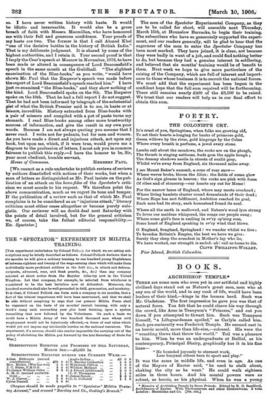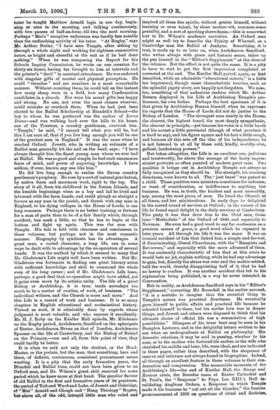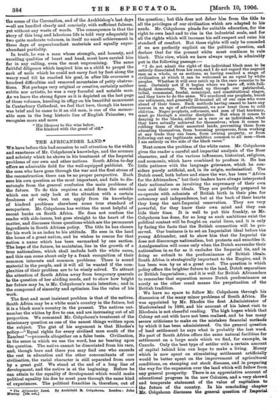BOOKS.
ARCHBISHOP TEMPLE.* THERE are some men who even yet in our artificial and highly civilised days stand out as Nature's great men, men who at any era of the world, and in any rank of life, would have been leaders of their kind,—kings in the human herd. Such was Mr. Gladstone. The first impression he gave you was that of natural force. You felt that he could cleave his way through the crowd, like Arac in Tennyson's "Princess," and cut you down if you attempted to thwart him. Such was Tennyson himself, "a Lifeguardsman spoiled," as Carlyle called him. Such pre-eminently was Frederick Temple. He seemed cast in an heroic mould, more than life-size,—colossal. His were the "wrestling thews that throw the world." Toil was a pleasure to him. When he was an undergraduate at Balliol, as his contemporary, Principal Shairp, graphically has it in his fine lines—
"He bounded joyously to sternest work, Less buoyant others turn to sport and play."
It was the same in middle life, and even in age. As one of the Mayors of Exeter said, "he used to stalk about, shaking the city as he went." He could walk eighteen miles in three hours. And his mental powers were as robust, as heroic, as his physical. When he was a young • Memoirs of Archbishop Temple by Seven Friends. Edited by E. G. Sandford, Archdeacon of Exeter. With Photogravure and other Illustrations, 2 vols. London : Macmillan and Co. [Ws. net,] tutor lie taught Matthew Arnold logic in one day, begin- ning at nine in the morning, and talking continuously, with two pauses of half-an-hour, till two the next morning. Perhaps "Mat's" receptive endurance was hardly less notable than the unflinching activity of his tutor. "At Rugby," says Mr. Arthur Butler, "I have seen Temple, after sitting up through a whole night and working for eighteen consecutive hours, as bright and, cheerful at the end as if he had done nothing." When he was composing the Report for the Schools Inquiry Commission, he wrote on one occasion for thirty-six hours, having tea brought to him at intervals and the printer's " devil " in constant attendance. He was endowed with singular gifts of mental and physical perception. He could " visualise " and see numbers in a most remarkable manner. Without counting them, he could tell on the instant how many sheep were in a field, bow many Confirmation candidates in a church. Nor were his moral gifts less happy and strong. No one, not even the most chance observer, could mistake or overlook them. When he had just been elected to the Balliol Scholarship at Blundell's School—the boy to whom he was preferred was the author of Lorna Doone—and was walking back over the hills to his home, one of the Trustees, a country gentleman, overtook him. "Temple," he said, "I cannot tell what you will be, but this I am sure of, that if you live long enough you will be one of the greatest men in England." It was the same when he reached Oxford. Jowett, who in writing an estimate of a Balliol man generally hit the nail on the head, says : "I have always thought him the finest young man whom we ever had at Balliol. He was so good and simple, he had such uncommon force of mind, and power of acquiring knowledge. I have seldom, if ever, known any one like him."
He did live long enough to realise the Devon country gentleman's prophecy. He rose by a sort of natural gravitation, by native force and enormous work, right to the top. The story of it all, from his childhood in the Ionian Islands, and the humble beginnings when as a boy and lad he lived and laboured with the farm bands, and could plough as straight a furrow as any man in the parish, and thresh with any man in England, to his dying collapse in the House of Lords, is one long romance. Perhaps there is no better training or fortune for a man of parts than to be of a fair family which, through accident, has sunk a little, so that he has to begin at the bottom and fight up again. This was the case with Temple. His tale is told with clearness and conciseness in these volumes, but perhaps not in the most romantic manner. Biography by syndicate has its advantages. A great man, a varied character, a long life, can in some ways be dealt with to advantage by the co-operation of several hands. It was the method by which it seemed to many that Mr. Gladstone's Life might well have been written. But Mr. Gladstone was fortunate in finding one great literary artist with sufficient knowledge and skill to command the whole even of his long career ; and if Mr. Gladstone's Life loses, perhaps, a good deal that co-operation might have added, yet it gains even more by its artistic unity. The life of a great Bishop or Archbishop, it is true, tends nowadays too much to be a matter of routine, of work, of business. "The individual withers, and the Church is more and more." And this Life is a record of work and business. It is so many chapters in English educational and ecclesiastical history. Viewed as such, it is admirably done by experts whose judgment is most valuable, and who express it excellently. Mr. H. J. Roby on the Kneller Hall episode, Mr. Kitchener on the Rugby period, Archdeacon Sandford on the episcopate of Exeter, Archdeacon Bevan on that of London, Archdeacon Spooner on the life at Canterbury, and the Bishop of Bristol on the Primacy,—one and all, from this point of view, they could hardly be better.
It is when we seek not only the student, or the Head- Master, or the prelate, but the man, that something, here and there, of definite, continuous, consistent presentment seems wanting. It is a pity that the early formative years, the Blundell and Balliol time, could not have been given to an Oxford man, and Dr. Wilson's great skill reserved for some period which he knew more at first hand. The peculiar flavour of old Balliol in the first and formative years of its greatness, the period of Tait and Ward and Lake, of Jowett and Coleridge, of "Mat" Arnold and Clough and "Hang Theology" Rogers, but above all, of the odd, intrepid little man who ruled and
inspired all these fine spirits, without genius himself, without learning or even talent, by sheer mother-wit, common-sense geniality, and a sort of sporting shrewdness,—this is somewhat lost in Dr. Wilson's academic narrative. An Oxford man might as well try to describe the Trinity of Whewell, as a Cambridge man the Balliol of Jenkyns. Something, it is true, is made up to us later on, when Archdeacon Sandford, who writes always with grace and historic sense, takes up the pen himself in the "Editor's Supplement" at the close of the volumes. But the effect is not quite the same. It is a pity to have to wait to get the first impression completed or corrected at the end. The Kneller Hall period, again, as first described, while an admirable "educational minute," is a little too impersonal, though some characteristic touches, such as the splendid pigsty story, are happily not forgotten. We miss, too, something of that audacious realism which Mr. Arthur Benson displayed in his Life of Archbishop Temple's pre- decessor, his own father. Perhaps the best specimen of it is that given by Archbishop Benson himself, when he expresses his regrets that the House of Lords did not do justice to the Bishop of London. "The strongest man nearly in the House, the clearest, the highest toned, the most deeply sympathetic, the clearest in principle,—yet because his voice is a little harsh and his accent a little provincial (though of what province it is hard to say), and his figure square and his hair a little rough, and because all this sets off the idea of his independence, he is not listened to at all by these cold, kindly, worldly-wise, gallant, landowning powers."
But taken altogether, the Life is an excellent one, judicious and trustworthy, far above the average of the hasty impres- sionist portraits so often painted of modern great men. Two qualities it brings out in Archbishop Temple not always as fully recognised as they should be. His strength, his crushing directness, were known to all. The "just beast" was patent to a child. These qualities were mistaken sometimes for rudeness, or want of consideration, or indifference to anything but business. He was, in truth, the kindest and most unworldly,
nay, among the most pious, of men. He loved the Church at all times, and her ministrations. In early days he delighted
in the sacred round of services at Oxford ; in the sunset of his life he found equal delight in the daily services at Canterbury. This piety it was that drew him to the Oriel men, those later " Methodists " of the Oxford of 1840, and especially to Newman. He even had a good word to say for confession as a precious means of grace, a good word which he repeated in later years. All through his life it was the same. It was an ironical accident of fate that linked him, a simple and fervent, if discriminating, liberal Churchman, with the "Essayists and Reviewers," and especially with the more advanced of them.
It was eminently characteristic of him that at this crisis he would bate no jot, explain nothing, while he had any advantage to gain, but, directly the stress was over and the matter settled, told the world, thereby disappointing half of it, that he had no heresy to confess. It was another accident that led to his explanation being published, in a way he never intended, in Convocation.
But in reality, as Archdeacon Sandford says in his "Editor's Supplement," correcting Mr. Roundell in the earlier account, "it is a mistake to imagine that the essential thing in Temple's nature was practical directness. He eventually gave himself to public affairs and practical life because he schooled himself to them, but his earlier love was in deeper things, and Jowett and others were disposed to think that his ultimate choice of official life was a renunciation of high possibilities." Glimpses of his truer bent may be seen in his Bampton Lectures, and in the delightful letters written to his son when an undergraduate at Balliol on philosophy. His domestic relations, it may be said in passing, whether to his sons, or to the mother who fostered his earlier, or the wife who cherished his middle and later, life, were ideal, and are indicated in these pages, rather than described, with the eloquence of reserve and reticence not always found in biographies. Indeed, all through an excellent feature in these volumes is their con- densation and compression. The memorable moments of the Archbishop's life—the end of Kneller Hall, the Essays and Reviews crisis, the Reredos cases at Exeter Cathedral and St. Paul's, the " Response " to Pope Leo XIII.'s Bull in- validating Anglican Orders, a Response in which Temple made it his business to "cut out all the thunder," the famous pronouncement of 1898 on questions of ritual and doctrine, the scene of the Coronation, and of the Archbishop's last days are handled clearly and concisely, with sufficient fulness, yet without any waste of words. The consequence is that the story of this long and laborious life is told very adequately in two quite moderate volumes, in itself no small achievement in these days of superabundant materials and equally super- abundant partiality.
In truth, he was a man whose strength, and honesty, and excelling qualities of heart and head, must have carried him far in any calling, even the most unpromising. The same faithful diligence which inspired him as a child to propel the sack of nails which he could not carry foot by foot along the weary road till he reached his goal, in after life overcame a hundred difficulties and removed mountains of petty obstruc- tions. Not perhaps very original or creative, certainly neither subtle nor artistic, he was a very forceful and notable man. As we leave the strong figure as it is depicted on the last page of these volumes, kneeling in effigy on his beautiful monument in Canterbury Cathedral, we feel that here, though hie tenure was brief and he came to it an old man, is one of the memor- able men in the long historic line of English Primates ; we recognise more and more "His likeness to the wise below, His kindred with the great of old."












































 Previous page
Previous page